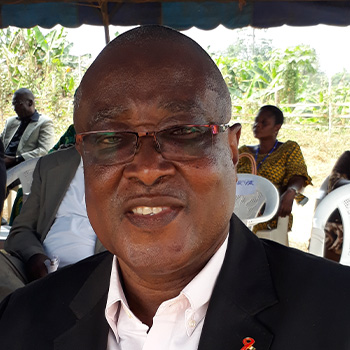Mercury Project Spotlight: Dr. Yapo Félix Boa

In this online spotlight, we feature Dr. Yapo Félix Boa, the scientific lead for the Côte d’Ivoire country team. Dr. Boa will collaborate with Abidjan-based consortium partner, Centre de Recherche et d’Action pour la Paix (CERAP), and Dr. Arsène Brice Bado, co-scientific lead for the Côte d’Ivoire research team.
In mid-March 2021, Côte d’Ivoire recorded the first case of COVID-19. To contain the spread of the virus, the Ivorian government implemented various restrictive measures at the beginning of the pandemic including the temporary closure of international borders and schools. As of September 2022, 87,159 confirmed cases and 824 deaths have been reported in Côte d’Ivoire. However, a study by the WHO suggests that these figures are vastly underestimated.
Côte d’Ivoire was the second country in sub-Saharan Africa to receive COVID-19 vaccines. As of September 2022, Côte d’Ivoire has administered a total of 18,547,812 doses of vaccines. With only 32% of the population vaccinated, Cote d’Ivoire remains far below the 70% global vaccination target set by the WHO for June 2022. With a steady supply of vaccine availability in Côte d’Ivoire, the Mercury Project: Health Ambassadors aims to address vaccine hesitancy in Côte d’Ivoire through an intervention, in which “health ambassadors” proactively engage households and offer direct opportunities to discuss concerns about the COVID-19 vaccine.
Dr. Boa is a Professor Emeritus of Medicine specializing in neurology at the Université Félix Houphouët Boigny. Previously, he served as the Director-General of the University Hospital Center (CHU) in Bouake, Côte d’Ivoire, and Director General of the Ministry of Health. We spoke to Dr. Boa to learn more about his extensive professional experiences in the health sector in Côte d’Ivoire. We asked him about sociocultural factors such as beliefs in the efficacy and safety of the vaccine that affect COVID-19 vaccine uptake in Côte d’Ivoire. Finally, Dr. Boa explains why he believes the health ambassadors strategy can be a promising model to increase vaccine uptake.
What is your current role, and what experiences has your organization had that can contribute to the design of the intervention?
I am a researcher and a Professor Emeritus of Medicine specializing in neurology. Earlier in my career, I led a research project on sleeping sickness in Daloa, Côte d’Ivoire. I subsequently held various positions such as the Head of the Neurology department of the University Hospital of Yopougon, Director of Health Establishments and Professions, Director of the University Hospital of Bouaké and Director General of the Ministry of Health.
Throughout these positions, my research was published in several peer-reviewed journals, and I was promoted to associate professor in 1990, then full professor of neurology at the Université Félix Houphouët Boigny in 2016. This career path gave me visibility into the world of health in Côte d’Ivoire, and it allowed me to get to know leaders at all different levels in the health sector in Côte d’Ivoire.
I have also held the position of Chairman of the National Committee of Experts for Polio Eradication since 2002. In this capacity, I am involved in meetings to analyze child immunization data and participate in polio vaccination campaigns in the field. Finally, over the past four years, I have incorporated my experience and knowledge of health issues into teaching the course, “Organization of Health Institutions,” at CERAP.
What are some of the important contextual factors to take into consideration in regarding vaccine hesitancy and encouraging uptake of the COVID-19 vaccine?
Anti-vaccine lobbyists are very active on social media networks. Unfortunately, in Africa today, citizens do not have much confidence in their governments. As a result, official information about COVID-19 is regarded with great skepticism. Health ambassadors going into the field must have a strong understanding of COVID-19 and the vaccine as well as the communities in which the awareness campaigns will take place. It is critical for health ambassadors to have positive working relationships with local health workers, in order to gain community trust.
Tell us a little bit about the intervention, and why Health Ambassadors may be a promising model for delivering information on vaccination.
I believe that well-trained health ambassadors can help address the growing spread of rumors and misinformation through social media networks and promote acceptance of the COVID-19 vaccine. This intervention has the potential to stop the spread of misinformation about COVID-19 and vaccinations circulating amongst the public, even accepted by some health professionals.
As the chairman of the committee of experts for polio eradication, I have been involved in many immunization campaigns. While we have encountered resistance in every vaccination campaign, we have managed to overcome it by taking the time to discuss the benefits of the vaccine.
What are some of the outcomes that you hope the research collaboration will produce?
This is scientific research, and the results must be convincing and indisputable. My hope is that the evidence that will emerge from this research will provide health actors with effective communication strategies that will encourage citizens to comply with health measures. Beyond that, this research will create a multidisciplinary team experienced in anthropo-sociological approaches to health issues and promote strong links between researchers and practitioners.